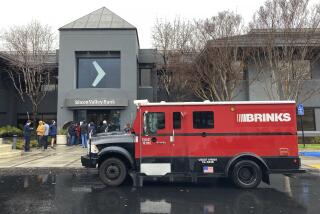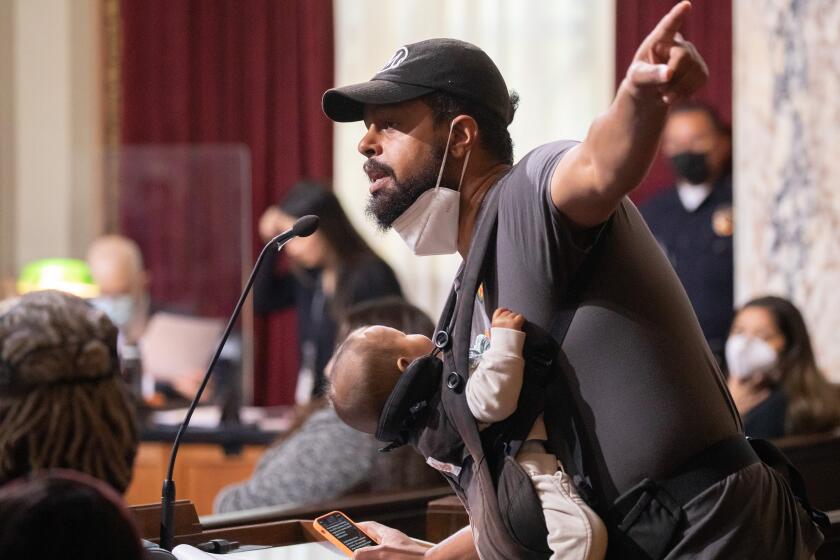Temecula denied annexation of land intended for gravel quarry
Temecula’s efforts to derail a proposed gravel mine near a pristine environmental reserve just outside of town were dealt a severe setback Thursday when officials voted against letting the city annex the land.
The 5-2 vote came after 10 hours of contentious public debate in which hundreds of avocado farmers, scientists, doctors, Native Americans and ordinary citizens tried to convince members of the Local Agency Formation Commission that an open pit quarry would spell disaster for southwest Riverside County.
Opponents said the mine would ruin the region’s air quality, sever the last remaining wildlife corridor linking inland California to the coast, increase truck traffic and cause irreparable harm to the Santa Margarita Ecological Reserve.
“We are citizens from all walks of life joining together to protect Temecula’s southwest hills from being scarred for life,” Barbara Wilder said. “The opposition has made it clear that it’s all about them. This land should not be handed over to them for a commercial venture. Open spaces are rare and declining daily.”
Mark Macarro, chairman of the Pechanga Band of Luiseno Indians, told commissioners the annexation would protect the place where tribal tradition says the Earth was created and the tribe was born.
“This is our Eden,” he said. “We cannot re-create where the world was created. There is only one Eden.”
Liberty Quarry, owned by Granite Construction, has been on the drawing board for more than three years. The mile long, 1,000-foot-deep quarry would be one of the largest operations of its kind in the state, producing 5 million tons of gravel a year with annual revenues expected to top $60 million. An estimated 1,400 trucks would come and go each day.
Temecula had hoped to annex 5,000 acres that included the mining site and put a stop to the plans.
Proponents of the 415-acre quarry, which include cities like Banning, labor unions, mining interests and those hoping to sell their homes to Granite, say the hazards have been grossly exaggerated by those who simply don’t want the gravel mine in their backyards. They also say the fast-growing region needs gravel and that it’s better to have it nearby and accessible rather than trucking it in from remote areas.
“Locally generated aggregate is actually a green industry,” said Gregg Albright, deputy secretary for environmental policy for the state Business, Transportation and Housing Agency. “The further you have to drive, the more greenhouse gases you emit.”
Redlands economist John Husing also spoke Thursday in support of the quarry. He said the economic effect on the community wouldn’t be especially great with only 277 jobs created but added that the growth of the area would boost demand for gravel. Ultimately, he said, such decisions require regional solutions.
Other backers derided opponents as environmental extremists more concerned with animals than people.
“If you have ever gone to the quarry site, you would see it’s just a pile of rocks,” Bob Kowell said. “If we only build things based on emotions, we will never go anywhere and our country will go downhill.”
When it came time to vote, only commissioners Bob Buster and John Tavaglione supported annexation. Both men are also county supervisors.
Buster seemed especially troubled by the proposed mine.
“This isn’t a small mine; it’s a mega-mine. This is the introduction of a huge new land use in one of the most fragile areas we have,” he said. “This will be right at the entrance to Temecula, right on the front doorstep. Can we cut Temecula out of the decision-making process?”
Despite their disappointment with the vote, opponents of the mine were heartened by the support of Buster and Tavaglione. In the months ahead, it will be the Board of Supervisors who ultimately decide whether the mine goes in.
“We will just go to the next phase now,” said Kathleen Hamilton, president of Save Our Southwest Hills, which began efforts to oppose the quarry. “I think we will have a good chance with the Board of Supervisors.”
--
More to Read
Start your day right
Sign up for Essential California for news, features and recommendations from the L.A. Times and beyond in your inbox six days a week.
You may occasionally receive promotional content from the Los Angeles Times.






